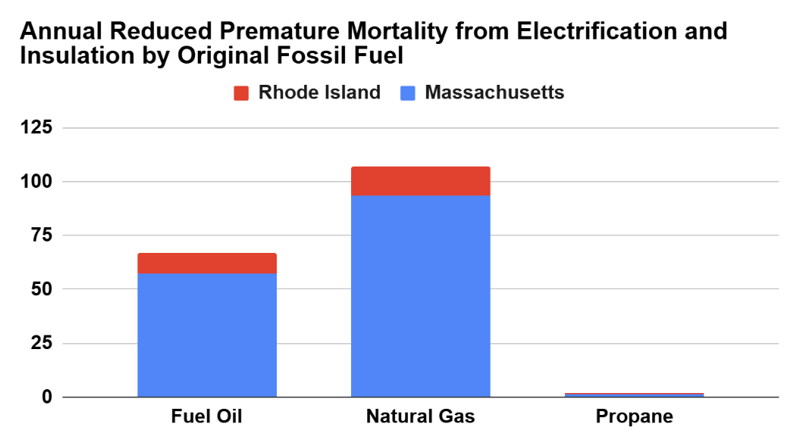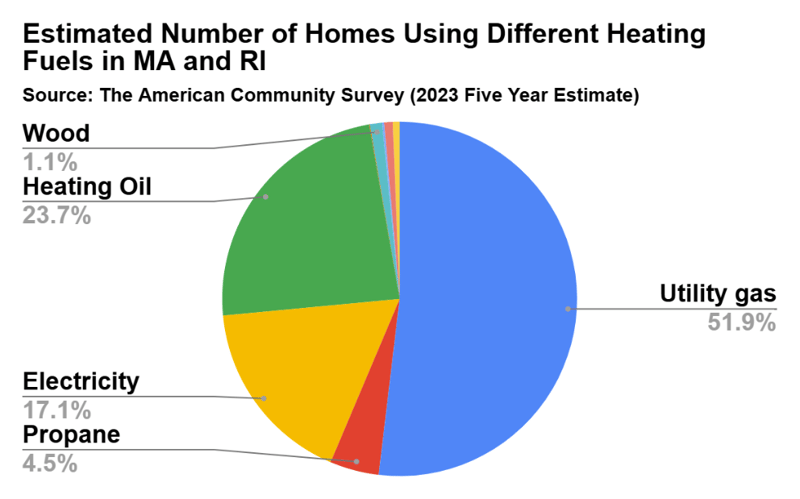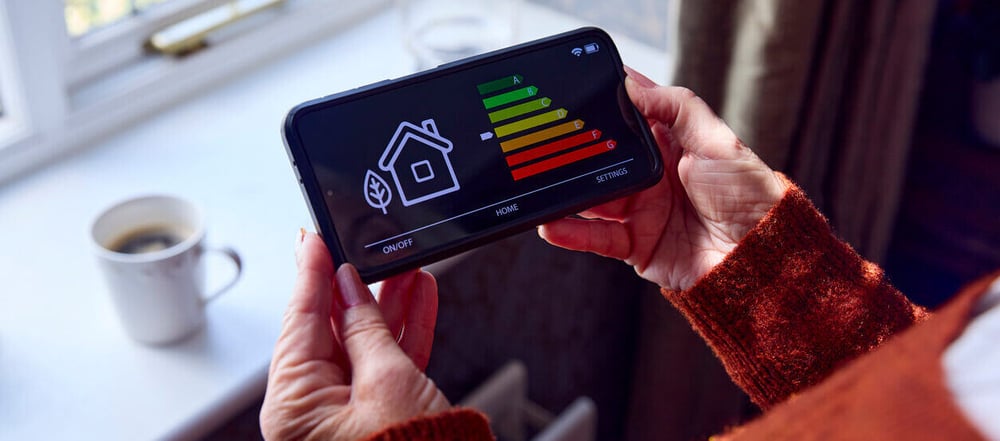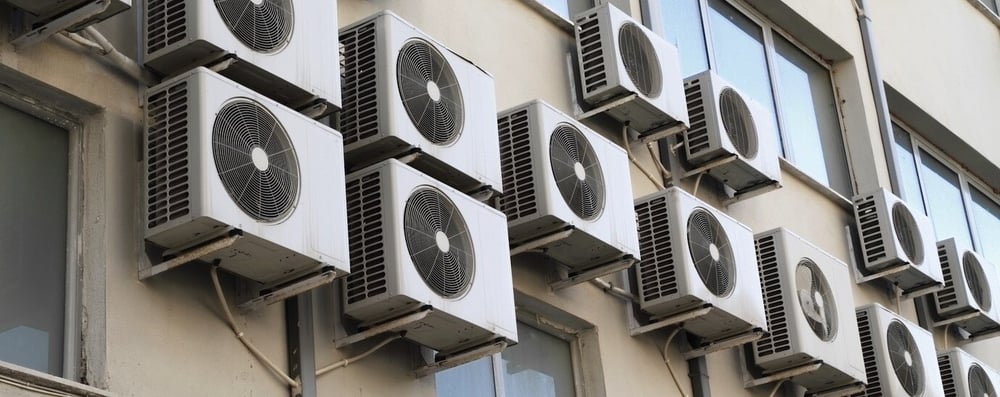Rewiring America, a non-profit focused on electrifying homes and businesses, recently released Breathe Easy, a report about how building electrification improves outdoor air quality and reduces premature deaths. The report finds that electrifying buildings not only reduces greenhouse gas emissions but also improves public health, especially for marginalized communities.
Key Findings From The Report
Health benefits: According to the report, US household electrification of space heaters, water heaters, and dryers would reduce pollutants like ammonia, nitrogen oxides and sulfur dioxide from entering our outdoor air. This would lead to an estimated $40 billion dollars' worth of health benefits, including 1,300 fewer hospital admissions, 220,000 fewer asthma attacks, and 3,400 fewer premature deaths annually.
Reduced emissions: Our electric grid, both locally and regionally, is getting cleaner over time, meaning that electric appliances can help Massachusetts and Rhode Island reduce their greenhouse gas emissions as required by law.
According to the 2022 Rhode Island Greenhouse Gas Inventory, released this past December, RI buildings made up 35.2% of statewide greenhouse gas emissions. In Massachusetts, buildings were the second largest source of greenhouse gases in 2020, making up 35% of statewide emissions.
State-Specific Data
In addition to the report, Rewiring America also provided a source of state-level data on the health impacts of electrification. This data shows that electrifying space heaters, water heaters, and clothes dryers, along with adding insulation, would prevent an estimated 176 premature deaths in Massachusetts and Rhode Island per year by reducing air pollution.

Looking closer into the data, a majority of health benefits are seen by electrifying appliances that previously used natural gas, compared to fuel oil and propane. As the graph below shows, this can be partly explained by the fact natural gas is the most widely used home heating fuel in the two states by a wide margin.
However, it’s worth noting that fuel oil leads to an estimated 38% of the mortality from building fuels, despite being the heating fuel for only 24% of homes in the two states. Heating oil and propane are the lower-hanging fruit of building electrification because the high price of oil and propane relative to electricity means that converting from oil or propane to electric heat pumps is both good for the environment and customers' pocketbooks.

Bio-Heating Fuels
One option that is sometimes presented as a way to reduce the health impacts of using fossil heating fuels like heating oil and propane, while avoiding the cost of installing heat pumps, is using more bio-heating fuels (fuels made from organic matter such as: plants, animal tallow and used cooking oil; this includes biodiesel and renewable diesel among other fuels). However, as a recent report for Greater Boston Physicians for Social Responsibility outlines, many of the claims made by the biofuel industry regarding the health benefits of using these fuels rest on questionable assumptions and it is not clear that bio-heating fuels are any better than their fossil fuel equivalents when it comes to reducing air pollution.
While biofuels may have a future in hard-to-electrify sectors, like long distance aviation, when it comes to building heating, biofuel’s uncertain impact on public health and high cost lead to it being an inferior choice to electrification.
How can states promote electrification?
While there are many policies that can support building electrification, we describe here three major policies under consideration in our region.
Building Performance Standards are regulations under which large buildings, such as offices and 10+ unit apartment buildings, are required to steadily reduce their emissions over time. Boston already has a program called BERDO which sets requirements for large existing buildings to report building energy and water consumption and keep their emissions below steadily falling benchmarks. In both Rhode Island (through the Building Decarbonization Act) and Massachusetts we will be advocating for statewide building performance standards in the 2025 legislative sessions. Polling in Massachusetts also shows this policy has the support of 63% of residents.

Clean Heat Standards are programs under which fossil fuel heating suppliers are required to earn credits through the installation of heat pumps or other actions that reduce building emissions. Rhode Island has not made progress in implementing this policy, but the Massachusetts Department of Environmental Protection has been working on writing regulations for a while and is expected to issue a draft regulation within the next few months.
Gas Utility Reform is another area we will be pushing for in both states. As we’ve written about before, major changes are needed if both states are to be able to deal with large numbers of customers switching from gas to heat pumps in the coming decades. Currently, gas utilities are taking on debt to build gas infrastructure at a level that cannot be sustained if the number of gas customers keeps shrinking. That spending needs to be reined in or it risks pushing gas rates even higher or putting utilities in a position where they will need to be bailed out by state governments. Fortunately, there are steps that can be taken to reduce the cost of the gas system, such as limiting new gas hookups and making it easier to decommission, rather than repair, old gas lines.
Heat Pump Incentives
Rhode Island
In Rhode Island, the entity providing your heat pump rebate depends on the type of fuel you’d be displacing. If you heat with gas, oil, or propane, the Clean Heat RI program, run by the Rhode Island Office of Energy Resources (RIOER), provides incentives for homeowners, businesses, and nonprofits to assist with the purchase of a heat pump. If you heat with electric resistance, Rhode Island Energy offers rebates for heat pumps and heat pump water heaters.
RIOER also hosts the Home Electrification and Appliance Rebates (HEAR) program, which offers rebates for electric appliances, electric wiring upgrades, and an electric load service center. Currently, the program is only available for low-income customers, but a moderate-income pathway is expected to become available this year. Interested individuals are encouraged to reach out to their local community action agency for more information.

Massachusetts
Massachusetts has a number of programs that support the adoption of heat pumps, with the most widely used being Mass Save. If you are served by a municipal light plant (an electric utility other than National Grid, Eversource, and Unitil) then you should look to see if they have any incentives. If you are not served by National Grid, Eversource, Unitil, Liberty, or Berkshire Gas for electricity or gas, then you are not eligible to receive Mass Save incentives.




Comments